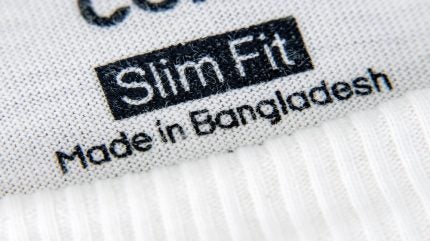
The four fashion companies have committed to the initial decarbonisation programme in Bangladesh and the Future Supplier Initiative is actively recruiting more brands with the hope of expanding to China, India, Vietnam and Türkiye.
Facilitated by the Fashion Pact and in partnership with the Apparel Impact Institute, Guidehouse and DBS Bank, the initiative offers a collective financing model to support “deep decarbonisation” in the apparel sector.
The Future Supplier Initiative explains that an estimated 99% of total fashion brand emissions occur within the supply chain (Scope 3), which is why it wants to accelerate the transition to net zero by sharing the financial risks and responsibilities of transitioning to renewable sources in Tier 1 and 2 garment and textile factories.
The scheme aims to help brands and suppliers to meet their Science-Based Targets (SBTs) and stay within the 1.5 degree pathway.
The first year of the scheme is prioritising factories based on impact and will build technical proposals for achieving “deep decarbonisation”. It will also de-risk lending to suppliers to implement these projects at more attractive rates.
The second year will focus on implementation and monitoring the climate impact created by the investments.

US Tariffs are shifting - will you react or anticipate?
Don’t let policy changes catch you off guard. Stay proactive with real-time data and expert analysis.
By GlobalDataBaselining and monitoring of emission reductions will also be conducted by the initiative.
Technical support will be offered to suppliers, alongside financial incentives such as de-risking loans to help remove the barriers that might prevent many factories from adopting electrification and renewable energy solutions.
The initiative aims to identify and match projects with the highest potential for impact, identifying common factory units, interventions and costs.
The Fashion Pact’s executive director and secretary general Eva von Alvensleben commented: “The cost of inaction on climate change is unaffordable. If the fashion sector is to meet its goals and transform its supply chain, we urgently need to address the gap between ambition and action.
“The Future Supplier Initiative is a unique opportunity for fashion retailers to join forces and drive progress towards science based targets and offer much needed financial and technical support to apparel suppliers in their journey to decarbonisation. No single business alone can solve this challenge, but by sharing the costs, risks and responsibilities of the transition to renewable energy, we can build an ecosystem of solutions and kickstart a new era of change.”
Bestseller’s owner and CEO Anders Holch Povlsen said: “We know that as an industry, we still have many steps ahead of us, but we believe that the Future Supplier Initiative can make a positive and significant difference.”
H&M Group’s CEO Daniel Ervér agreed and noted: “The Future Supplier Initiative shows that solutions are readily available and come with proven impact, but it requires commitments from brands and investors that are willing to invest. We encourage others to join our efforts to tackle our industry’s negative climate impact.”
“The joint effort that represents the Future Supplier Initiative is definitely a huge step forward from the industry in allowing for affordable funding for factories to engage in energy efficiency initiatives, and a sign that cooperation is possible in our sustainability journey,” Mango’s CEO Toni Ruiz added.
Bestseller and H&M Group announced plans to develop an offshore wind energy project in Bangladesh in December 2023.
In May Just Style investigated why fashion brands are being urged to get on board with collective financing to support the global apparel supply chain’s goal of becoming more sustainable.



